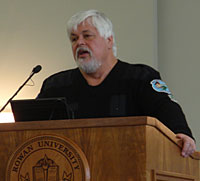"Whale Wars" Captain Urges Action
"Whale Wars" Captain Urges Action

Capt. Paul Watson, a co-founder of Greenpeace and leader of the Sea Shepherd Conservation Society, may be a pirate. But he's OK with that.
Watson, who addressed the Rowan community as part of the President’s Lecture Series April 23, said he, along with other Sea Shepherd conservationists, have sunk or incapacitated scores of illegal whaling and shark-hunting vessels over more than three decades at sea and they're not done yet.
“They call us all sorts of names – ecoterrorists, pirates. I like that,” he said.
A salty, white-bearded man of high intelligence and fast speech, Watson said the goal of Sea Shepherd – whose work has been documented on the Animal Planet series Whale Wars – is to disrupt illegal whaling operations around the world, pretty much by any means necessary.
Using their own vessels to chase whaling ships, Sea Shepherd personnel have been fired on with high pressure water hoses and Watson himself was nearly run over by a Soviet-era ship hunting sperm whales with high explosives.
In return, Watson and crew have blasted illegal whaling vessels with “rotten butter bombs” and 45-pound cannon loads of chocolate pie filling.
"It's very effective," he said, “but we’ve never caused any injuries to our opponents and they’ve never caused any to us.”
Addressing several hundred students, faculty members and professional staffers, Watson said his organization has a mandate not to harm fishermen but his people sink or incapacitate whaling vessels without qualms. They take aggressive, sea-bound action to protect turtles, seals and other endangered species and attempt to disrupt the wanton, unlawful slaughter of millions of sharks per year by Chinese fishermen.
Watson, who left Greenpeace in the mid-1970s to found Sea Shepherd, said shark fishermen have a singular mission – to land as many fish as possible, hack off the dorsal fin for shark fin soup – a Chinese delicacy – and toss the mutilated corpses back into the sea. He said many millions of sharks are killed for the fins alone every year and that virtually every species of shark – a vital predatory link in ocean ecosystems – is at risk for extinction.
And he said despite popular belief to the contrary, sharks do not, as a rule, kill people.
“The number of people killed by sharks each year is five. The number killed by ostriches is 100,” he said. “More people are killed each year by falling soda machines.”
Though many governments consider his work illegal (Watson has been tried, and acquitted, on Canadian nuisance charges that could have imprisoned him for life) he sees his role as that of a lawman filling a void.
In fact, Watson said, his organization works directly with law enforcement agencies to combat poaching, illegal whaling and overfishing.
“We have all the laws, regulations and treaties to protect the world’s oceans but we don’t have the political will to enforce them,” he said.
Watson, who grew up in a Canadian fishing village, said the planet’s oceans are literally dying from overfishing. He said between rampant overfishing, ecologically devastating “fish farming,” and the production of beef (“it takes 3,000 gallons of water to produce one pound of meat”), the planet is in peril.
Speaking for a fast hour, Watson said all Sea Shepherd ships are vegan vessels on which he permits no meat consumption of any kind.
“I grew up eating shrimp, flounder and lobsters,” he said. “Believe me, if I can give up seafood, so can you.”
Watson concluded by saying he and other conservationists are making a difference and that it might, possibly, not be too late to save endangered species, the oceans, and the Earth itself.
“Sure, there’s risk,” he said of their often dangerous means. “But it’s a far more noble endeavor to risk your life to protect a whale or an endangered ecosystem than some sheik’s oil well.”
For more information, visit Sea Shepherd online